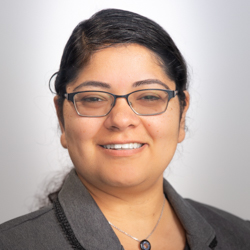Biography
I am a physician-scientist whose primary focus is improving the delivery of ambulatory care to vulnerable populations through participant-centered engagement approaches that are implemented both at the individual and organizational level. My own clinical family medicine practice keeps me grounded in the reality of gaps in our health care system. Educating and mentoring the next generation offers hope that innovative solutions will be found. It also offers the opportunity to learn from mentees and expose them to new ways of thinking and models and tools that can help guide their own efforts.
Areas of Specialty
My leadership roles include being: the Contact PI for the Southwest Center for Clinical and Translational Innovation (SW CACTI) funded by an award from NIH/NCATS; Assistant Vice President of Research for Clinical and Translational Research where I am a member of the Health Sciences Center Core group; Associate Chair for the Department of Family and Community Medicine, where I lead promotion and tenure processes.
My research program focuses on: 1) Health experiences research 2) Health services research with adult indigenous populations 3) Primary Care Redesign
For the Health Experiences Research Network, I am its National Training Director, a founding and national steering committee member, and conduct research with these methods. More information about this network is at healthexperiencesusa.org. I am a co-investigator on the NIH/NIA Addressing Alzheimer's Disease and Related Dementia Disparities: The American Indigenous Cognitive Assessment (AMICA) award which is developing a culturally appropriate dementia evaluation toolkit for American Indian Communities. I am a MPI on the Primary CARE-Building Research Integration in Different Geographic Environments (PC-BRIDGE) grant, which established a New Mexico and Arizona node of the Care for Health Initiative funding by the NIH Office of the Director.
Education
University of Chicago: BA
Medical College of Virginia: MD
University of Wisconsin: MPH
University of Wisconsin: PhD
Undergrad: Bachelor of Arts in Political Science, University of Chicago
Graduate: Master of Public Health, University of Wisconsin
Med School: Doctor of Medicine, Medical College of Virginia
Doctoral: Doctor of Philosophy in Population Health Sciences, University of Wisconsin
Achievements & Awards
2023 Executive Leadership in Academic Medicine (ELAM) Fellowship
2020 UNM Faculty Mentor Development Program
2017 Delta Omega Honorary Society in Public Health (Gamma Xi Chapter)
Distinguished Alumnus
2015 University of Wisconsin Medical Foundation Physician Development Leadership Program
2015 Patient Choice Award, North American Primary Care Research Group Annual
Conference
Key Publications
Journal Article
Walsh-Felz, Devin, Westergaard, Ryan, Waclawik, Gabrielle, Pandhi, Nancy, 2019 “Service with open arms”: enhancing community healthcare experiences for individuals with a history of incarceration Health & Justice, vol. 7, Issue 1 https://doi.org/10.1186/s40352-019-0101-1
Journal Article
Pandhi, Nancy, Gaines, Martha, Deci, David, Schlesinger, Mark, Culp, Cecilia, Karp, Zaher, Legler, Christie, Grob, Rachel, 2020 Broadening Medical Students’ Exposure to the Range of Illness Experiences: A Pilot Curriculum Focused on Depression Education Academic Medicine, vol. 95, Issue 1, 72-76 https://doi.org/10.1097/acm.0000000000002893
Journal Article
Micek, Mark, A. Arndt, Brian, Tuan, Wen-Jan, Trowbridge, Elizabeth, Dean, Shannon, M. Lochner, Jennifer, Sampene, Emmanuel, Pandhi, Nancy, 2020 Physician Burnout and Timing of Electronic Health Record Use Applied Clinical Informatics Open, vol. 04, Issue 01, e1-e8 https://doi.org/10.1055/s-0039-3401815
Journal Article
Grob, Rachel, Schlesinger, Mark, Wise, Meg, Pandhi, Nancy, 2020 Stumbling Into Adulthood: Learning From Depression While Growing Up Qualitative Health Research, vol. 30, Issue 9, 1392-1408 https://doi.org/10.1177/1049732320914579
Journal Article
Waclawik, , Kotovicz , F, Walsh-Felz , , Tsering, , Pandhi, Nancy, 2020 Supporting Academic Primary Care Teams Serving Refugees: A Qualitative Study Refugee & Global Health
Courses Taught
My teaching experiences include instructing student and resident learners on clinical skills in the context of my own practice, guiding graduate and doctoral students through successful completion of theses, providing guest lectures for graduate-level courses, leading the second and third year family medicine community health rotation for family medicine residents, co-developing and teaching methodological short courses on patient and stakeholder engagement and qualitative health experiences research, and co-developing medical school and resident curriculum that centers patient experiences. A particular area of emphasis has been on the development of scholarly skills in individuals ranging from students to early career faculty, both through individual and group mentoring sessions. Nationally, I led the development of an online webinar curriculum on scholarship for the Society of Teachers of Family Medicine Foundation's New Faculty Scholars Program.
The above teaching activities have resulted in several published articles, conference presentations, toolkits, and successful funding proposals.
Research and Scholarship
Refereed Articles
Pandhi N, Zgierska A, Kennelty K, Tuan WJ, Rabago D. “Levering the Clinical Translational Science Award Network to Advance Family Medicine Research” Journal of American Board of Family Medicine, 2024, 37(Supplement 2):S122-S128.
Grob R, Schlesinger M, Wise M, Pandhi N. Stumbling into Adulthood: Learning from Depression While Growing Up. Qualitative Health Research, 2020, 30(9):1392-1408.
Pandhi N, Gaines M, Deci D, Schlesigner M, Culp C, Karp Z, Legler C, Grob R. Broadening Medical Students’ Exposures to the Range of Illness Experiences: A Pilot Curriculum Focused on Depression Education. Academic Medicine, 2020, 95(1): 72-76.
Pandhi N, Kraft S, Davis S, Berkson S, Kamnetz S, Trowbridge E, Koslov S, Caplan W. Developing Primary Care Teams in Academic Health Systems: Lessons Learned from Implementing a Microsystems Approach. BMC Health Services Research. 2018; 18(847): 4-10.
Caplan W, Davis S, Kraft S, Berkson S, Gaines ME, Schwab W, Pandhi N. Engaging patients at the front lines of primary care redesign: operational lessons for an effective program. Joint Commission Journal on Quality and Patient Safety 2015; 40(12):533-540.
Toolkits/Websites
Pandhi N, Davis S. Understanding health experiences and values to address social determinants of health. In: Edgoose J. (ed) Health Equity Curricular Toolkit. Parkway Leawood KS: Health Equity Team for Family Medicine For America’s Health; 2018.
Davis S, Pandhi N. Deeply engaging patients with a mix & match of methods toolkit. HIPxChange Toolkit, 2017. https://www.hipxchange.org/DeeplyEngagingPatients

